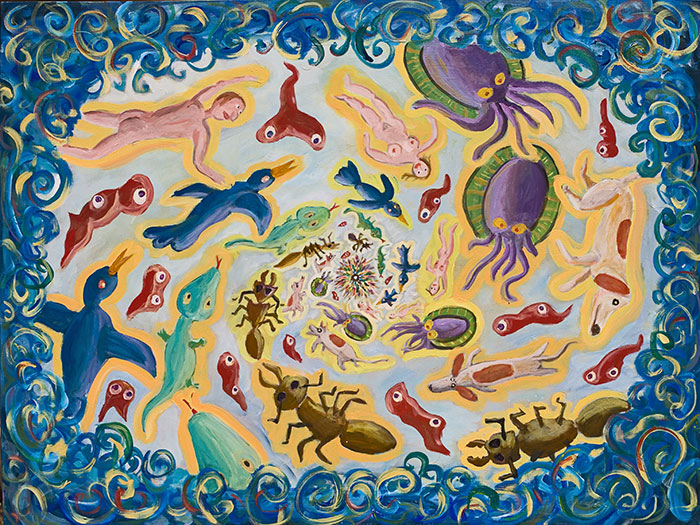
Search
by Kek

The Deadguy was sat at the bar, waiting for me like he said he would. He was drinking a crushed-ice cognac slurrpee through a straw.
He waved me over. “You’re Arthur, right? Wilamee’s boy. I’m Jack. Jack McGee, her brother.” He extended a hand for me to shake. The skin felt weird: crumbly, but smooth at the same time. I tried not to think about it or flinch, but it was like touching a live snake; it didn’t feel anything like you expected it to. ”You probably don’t remember me. I wasn’t around much when you were a kid. And then I, well, you know...”
“Yeah.” I couldn’t bring myself to look at him—it was like that strange mixture of curiosity and almost-shame you get when you’re around a deformed child or the terminally ill—so I glanced round the bar instead. It used to be one of those creepy oldster places where middle-aged men hung out with younger women, but then it got taken over by some co-operative who brewed their own beer and liquor. These days it was over-run by Deadguys. They sat alone in booths—reading books, for Christsake—or in small groups around tables shooting the breeze and discussing politics. Pixellated images and columns of text in Franklin Gothic and Times scrolled slowly up the walls; a slo-mo reverse waterfall of vintage newspaper articles documenting forgotten atrocities in the Democratic Republic of the Congo or the death of some celebrity I’d never heard of. The co-op couldn’t afford a Turing, so a DJ algorithm mixed Old Skool Byt.Hop samples into a syrupy-sounding stream of auto-tuned vocals and sluggish stutter-beats. It sounded like the musical equivalent of seasickness, but the Deadguys seemed to like it. ”It was, uh, cancer or something, wasn’t it?”
He sucked on his slurrpee. “Yep, TTP.”
“I don’t know what that is,” I said, and I didn’t much care either. I could’ve easily pulled it down with my GoogleLobe, but I really didn’t want to know. It sounded like something old and shitty. Instead I kept looking back towards the entrance, praying that Mark would show up and come to my rescue.
“Transmittable Tumour Plasmid. It was like—I dunno—a virus, but different.”
“Oh, right.” I nodded; anything to avoid making full eye-contact. Well, maybe “eye” is the wrong word; they were actually photo-sensitive prostheses or something.
He finished his drink and clunked the glass down noisily on the bar to get the bartender’s attention. “Pull up a stool and I’ll get you a drink.”
“Look, I, uh…I don’t think I’ll be staying very long.” I felt awkward, uncomfortable. I checked the old brass clock that sat behind the bar in amongst the brightly colored liqueur bottles and the display of yellowing bank-notes. I was too spooked to stay, but too nervous to leave. He must have thought I was a complete retard.
“C’mon, Arthur—please. Just one drink. I promise won’t bite. In fact, I don’t even have any teeth.” I prayed he wouldn’t open that weird-looking mouth of his and show me. I’d seen some pictures and it was gross. Deadguys were toothless; they had a molded ridge made from something that looked hard and vaguely plastic. But—even worse—there was no tongue either, just a maw. A gullet-hole. It was all too freakish for words. I must’ve winced or pulled a face when he said that, because his expression changed. “I’m sorry, that was a really dumb thing to say. Guess I was more nervous about meeting you than I realized. Mikey! Get me another one of these and—what are you having, Arthur—a beer?”
I shook my head. “No, I…ahh, shit, alright then. Whatever you’re drinking.”
He held up two long, slender fingers. “Make it two, please, Mike.” The bartender was mostly Cauc, but he looked a little like Thelonius Monk. He nodded and fired up the slurrpee-machine, totally unfazed by the fact that he was serving a DeadGuy. I guess he was used to them. “I really appreciate you coming here, Arthur. I know how difficult this must be for you…”
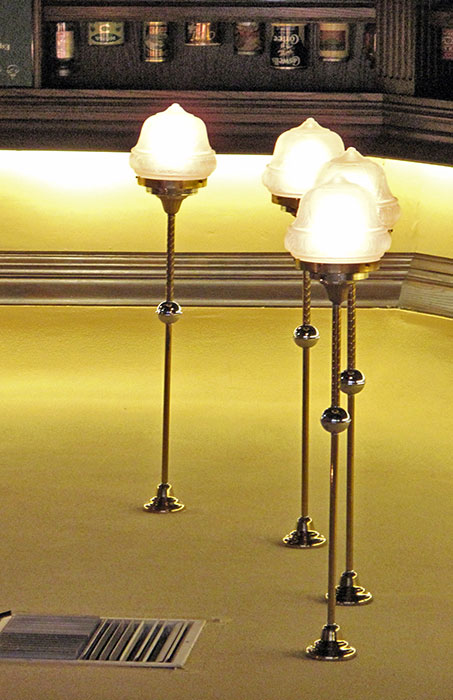
I pulled myself up on a stool and sat with my back to the bar and my elbows resting behind me. I wasn’t quite ready to look at him face-on yet. “So why did you contact me?”
“Because you and your brother are the closest living kin I’ve got. You guys knew me back in the day. You remember me.”
“A little, I guess. But it was a long time ago and I was only a kid. But surely you’ve got friends, people you can…oh, you know…” I leaned back and watched the other Deadguys going about their business—drinking, talking, playing cards, shuffling around like old people in their thrift-shop shirts, jeans and work-boots. It was like a uniform or something. Did everyone used to dress like this back then? Something about them—something about him—irritated me, but I wasn’t sure what. They all looked the same with their sallow complexions and their ugly-looking pre-molded bodies, as if they’d just rolled off a production-line. How could you even tell them apart without checking their RDIF tags? I deliberately blocked my GoogleLobe when it tried to give me an answer.
“Friends? Sure, I’ve got friends, but…” His face reconfigured itself into some weird, unreadable expression. “Well, you must’ve been curious too, otherwise you wouldn’t be here.”
“I almost didn’t come.”
He nodded slowly. “I don’t blame you. I’m sure I’d probably be the same if our situations were reversed. What about Mark though? How’s he coping with all this?”
I found myself starting to laugh. “Man, you really don’t know, do you? Okay, Mark’s into this, like, Jesus Freak thing. Your very existence is an affront to his beliefs. He thinks that this is the End Days and you…you people are like the Anti-Christ or something.”
“And what do you think?”
I shrugged. “I think Mark’s a complete tool sometimes, but he’s still my brother, y’know?” I pinged him and checked my head:mail, but he still wasn’t answering my texts.
“Yeah.” The Deadguy tapped a finger slowly on the bar, like he was thinking about something. I found myself fascinated by the way it moved. There were no bones, no joints—just a dense, fluid-filled tissue-matrix—so the finger sort of curved back and forth, rather than bent. The ‘skin’ was mottled and waxy-looking—a dark, almost-yellow color that had no name, but reminded me of bruises and jaundice. His hand was already scuffed and worn in places, chipped by random impacts. The fingers had no nails. “Well, look,” he said in that flat, deadpan voice of his, “tell him that I’m real sorry this ain’t the Rapture and that me and my buddies can’t lead you all into The Great Beyond, but we’re too busy working for a living or playing Texas Hold ‘Em.” He made a strange aurrh-arruh sound and it took a second for me to realize he was laughing. I GoogleLobed The Rough Guide to DeadFolk and it said that Deadguys have got this whole black humor thing going on. Some sort of coping mechanism, apparently.
“You’re not religious, then?”
“Nah. Not even slightly.” He nodded his thanks to the bartender as our drinks arrived.
“Not even after—you know—everything that happened to you?”
“I died, Arthur. It’s okay: you can say it out loud. I won’t be offended.” He slid my drink across to me. “But to answer your question: no.” He did that weird Deadguy laugh-noise thing again. “I was dead, and then they brought me back with that fucking machine of theirs—that thing that’s, like, half the size of Belgium…”
“It’s called G-W.E.B.” My ‘Lobe instinctively pulled down a reference-stack, even though I must’ve skimmed this stuff a dozen times when I got the head:text telling me that he’d been reconstituted. G-W.E.B. had originally been built as a non-baryonic dark-matter detector. We’d gone searching for the final missing N-th piece of the universe, but we’d found something else out there instead: us. And now they had all these dead people mapped on quantum server-arrays.
Not everyone that had ever lived—I mean, imagine how insane it would be if you could bring back Einstein or Mozart or Pablo Picasso—no, just the more recently departed. After a decade or two your boson signature fades out, like a bright light that imprints itself on your retina for a few seconds and then disappears. That’s a bad metaphor, I know, but the physics are so fucking complex that even a Turing network can only barely grasp them.

In less than a second the GoogleLobe stacked up a bunch of info-layers in my Preconscious. That old ad-campaign was right: it really was the third part of your brain. I sifted through the GData with imaginary synaptic fingers, pulling out numerous cross-linkages and allowing a stream of vpegs to flow into my koniocortex. Schematics, aerial photographs, equations, legal and moral debates, Papal Bulls and New Age bullshit: a tsunami of peripheral data; an info-sandstorm. Was Deadguy consciousness ‘real’ or just some weird artifact of quantum computing? Were they authentic reconstitutions of human neural-nets or artificial personas created by recombining billions of yottabytes of data—just Turing machines looking in the mirror?
I didn’t know and I didn’t care either. I wiped my short-term buffers, but a stray phrase had snagged in my language-cache: some prose-mathematician called Chihan Yurtsi speculating that the Deadguys had returned from he called “an Oort-Cloud of Lost Souls.” I don’t know why, but I kinda liked that. It hinted at some new cosmology. Something abstract and distant. Something that wasn’t sat next to me in a bar. “Yeah, The W.E.B. part stands for—“
“Weak Elementary Bosons. Yeah, I know what G-W.E.B. is: it’s the world’s biggest search-engine. But instead of data it pulls down people.” More Deadguy humor, I guessed. “Listen, you just tell that brother of yours that while I was gone I didn’t enter the sixth Bardo, become an Operating Thetan or look upon the face of God.” He sucked on his slurrpee and made a vague, languid gesture which I guessed was supposed to be the Deadguy equivalent of a shrug. “I know what some people say they saw, but I swear—hand on my, uh, heart—that nothing like that ever happened to me.”
I shook my head and found myself smirking. “Oh, that’s soo gonna piss him off.” I took a hit of the slurrpee and despite all the ice the brandy still burned on its way down. I coughed. “Oh, man…”
“That’ll put hairs on your chest,” he said, “well, yours, not mine. It’s funny, but I kinda miss having nipples. Never took much notice of them when I did have them.” Again, with that stupid ha-ha noise. I wondered what the fuck he had to laugh about?
I sucked at the straw until my eyes began water. “And you’re able to get drunk on this stuff?”
“Kinda.” He swirled his slurrpee cup, stirring the ice with a straw. His features flowed into a half-smile. “If you drink enough of it. This blend’s the best; it’s got a bunch of additives that have a, uh, disjunctive effect on my metabolism.” Another laugh. “Don’t worry, they’re not toxic for Livefolk. Mike’s co-operative have pretty much cornered the Deadguy booze market.” I took another hit and tried not to think about his innards: the respun pig-gut perineum and the bronchiole-tree made of neoprene. I set some filters on my ‘Lobe so it wouldn’t pull down any pictures.
He raised his arm and swung it back at an angle that would’ve dislocated his shoulder if he’d still been human. I couldn’t figure out whether he was just stretching or if this was some new form of body language that no one had bothered documenting yet. “Can’t get used to this economy of yours, though. Y’know, not paying for stuff. Still, Mikey lets me help with the chores sometimes…”
“It’s not ‘my’ economy,” I said, irritated. I poked my straw deep down into the ice, rooting around for booze.
“Oh, you know what I mean, Arthur: Freeconomics, “Free”…or whatever it’s called. There’s no such thing as “free” in this world. Someone, somewhere still has to make all the stuff we use. “Free” just means you’re free from having to watch some poor stiff laboring away in a Polynesian sink-hole. “Free” is just an illusion, kiddo. We’re still living in the after-echo of Capitalism…”
“You talk funny.”
“I know. Generic, low-spec voice-chip.” He tapped his throat. “Cheap and nasty, just like me…”
“No, I mean the stuff you say. It’s like you’ve always got a point to make.”
“And you don’t?”
Fuck you, I thought. Who are you to lecture me from beyond the grave? You were hardly ever there when I was growing up; it was just me, Mom and Mark.
It was then that I realized what was really bugging me and why I was so angry with him. I finished up the slurrpee, this time savoring the burn from the alcohol. “Oh, you’re so smart, old man. You think you know everything, but you don’t.” I tapped my head. “I’ve got the entire history of Everything up here, on tap—the biggest fucking library ever assembled. Ask me a question! Anything you like. There’s nothing you can tell me that I can’t look up for myself.” I realized just how childish and moronic I sounded, but I was beyond caring now. It was his fault I was being such an asshole.
“Knowledge isn’t just something you look up and learn—it’s earned through experience.”
“Oh, don’t give me that respect-the-wisdom-of-your-elders bullshit.” I gestured back towards the Deadguy geezers playing chess, nodding in time to the music and chatting to each other in their annoying little buzz-buzz voices. “So, what, you and your pals have come back to save us from ourselves?”
“No, we just…” He shook his head. “You’re pissed at me. I get that.”
“You were never there when I was a kid, ‘Jack’—and now—oh look!—up you pop again. Howcum you got to come back, huh? If there’s no God, then whose bright idea was it to pick you? Is there a fucking lottery in the afterlife?” I balled my hand into a fist, ready to hit either him or the bar, I wasn’t sure which.
“I know how unfair it all seems.” He moved his head slowly from side to side in a way that described his shame more eloquently than any words ever could. Ostermann’s Syndrome: a Deadguy-specific form of guilt felt by those who don’t believe they deserve a second chance. “Arthur, you know that if there was any way—any way whatsoever—that I could change things, then I would…”
I nodded, but didn’t say anything.
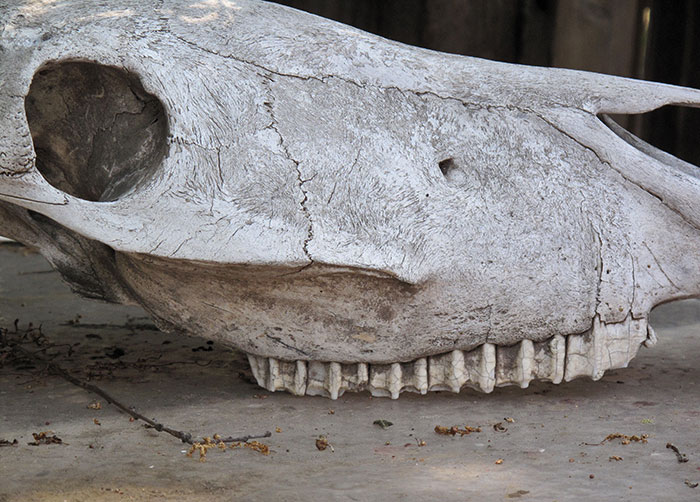
He studied his empty slurrpee cup. “Wilamee always said I wouldn’t ever amount to much and she was right.”
Wilamee. No one had called her that in years. “Mom…?”
“Yeah, your mom. She was always there for me when I came back off of some half-arsed tour with my tail between my legs. She was a fucking rock, that lady.”
Now that my anger had surfaced I was finally able to look him in the eye. It was hard to read a Deadguy’s face—the tics and the visual cues were either missing or completely different—but his eyes seemed to somehow look out at me back down through the years. For a moment I had a sense of the person sat behind the array of photophilic cells.
I remembered that person swinging me round like an airplane in the garden on Lafayette St. while he sang some stupid song he’d made up, then playing catch with Mark and me in amongst the cherry trees. “Let’s make this a bit more difficult,” he’d yelled, “you gotta get the ball over the tree without it touching the leaves, okay?” Then he stepped backwards and fell over a rake lying in the grass. I laughed ‘til I peed my pants. And another time: the four of us eating Thanksgiving together one year. The power went off, so we lit some little candles and ate our meal in half-darkness. Most of all, though, I remembered the look on Mom’s face as he packed his rucksack to play some shows in Wisconsin.
Without even thinking about it I loaded a bunch of photos into a carousel app in my visual cortex and cycled through them. Pictures of Mom and Uncle Jack. I auto-cropped them, made them semi-transparent and overlaid Uncle Jack’s features onto the Deadguy’s, studying them for points of similarity. I couldn’t find any.
His new face looked as if it had been stolen from a statue—a cheapskate Michelangelo carved from dark yellow soapstone. It was threaded by tiny veins of discoloration, like an organic form of marble or a small delicate painting by Pollack. In the uncertain amber half-light of the bar it seemed as if he had been sculpted from some exotic variety of cheese.
In 19-th century France there'd been a vogue for death-masks and Jack’s features had a similar quality. The bald head and flattened ear-lobes; the solemn-looking eye-sockets and nose all seemed to belong to someone else; his face was like a copy—a cast or three-dimensional imprint that seemed to hint at some other person’s absence. Did Turing machines do irony? Or was each Deadguy also meant to be a living monument to all the other forgotten souls who had passed over but could never return? With his patrician nose and his working- joe brow he was neither handsome nor homely, but a sort of idealized ‘noble’ everyman whose features held echoes of Madison Avenue, 18 th century Classicism and Suprematist art. The jerky, unnatural way his expression changed reminded me of an old stop-motion movie.
The Deadfolk had been designed by a conference of Turings as a durable, resource-effective body-form that could house Humanity 2.0. Uncle Jack was sporting a Cauc model that looked vaguely East European now that I thought about it. I’d seen Asian and African analogues elsewhere in the bar and there was talk that a new range of artificial physiognomies would soon be available for those whose sense of identity or belonging wasn’t tied up with ethnicity. Some had been psychologically devastated by the loss of their original faces, but the majority seemed to relish the opportunity of discarding their old identities and making a fresh start.
“You were a musician, right?”
“Yeah. A guitarist.” He looked down at his fingers as if he didn’t recognize them any more. He flexed them so that they seemed to ripple back and forth like a tiny Mexican Wave. “But I wasn’t any good though. She was right, your mom.”
“She used to play your music all the time. When you were away.” I signaled Mikey for another two drinks.
“Did she? I…I didn’t know that.”
“Dad was no good. That’s why she threw him out. But you…you were okay.”
“When I was there.
“Yeah, when you were there.”
“I, uh…there used to be this thing, an illness called Alzheimer’s. Old people used to get it. Sorry, you’ve got that damn encyclopedia in your head, so I guess you already know all this stuff…”
I switched off my head:mail. Screw you, Mark, I thought. You lame chickenshit excuse for a brother. You should be here. I wiped the mail-bucket without even checking it, and then I nuked the photostreams, the crappy music-mixes and all the inane little auto-animes and haiku-blips from the hundreds of so-called ‘friends’ that I’d never even met. No more bullshit distractions. “No, I’ve turned it off. I’m listening now.”
“Well, what I’ve got is a bit like that: drop-outs…little holes in my memory. Stuff that got lost while I was away. When they reconstitute you they try and fill in the blanks as best they can. You know, with any relevant data they can get hold of. But it’s just padding really—a rough sketch rather than a painting. No one can replace your personal memories, the intimate stuff.” He seemed to run out of words for a moment. “I need someone to remember her for me, Arthur.”
I didn’t know what to say.
“You’ve got her eyes, you know. And the way you yelled at me when you were mad, well…”
“I miss her, Uncle Jack,” I told him. “I miss Mom.” The tears came so suddenly that it seemed as if they had always been there. Embarrassed, I wiped at my eyes with the side of my wrist.
He nodded. “Yeah, me too.”
Mikey appeared with fresh drinks. He grinned. “So have you two kissed and made up yet?”
“Ahh. Fuck you,” I said and we laughed. I guess Mikey had already seen this scene play out a hundred times before.
So we sat and drank and Uncle Jack told me some of the things that he did remember. How Mom had been part of The Protests when she was young, back before she’d had Mark and me. He told me what had really happened that day when half a million of them had marched on the NY Stock-Exchange. Mom, Dad and Uncle Jack had all been there. They had seen the pitched battles with corporate militiamen. The beatings and the deaths. Mom’s eyes and throat had bled from the gas they used on the crowd and that’s why she had such bad asthma later on in life. But she’d never once mentioned any of that stuff to me or Mark, even though they’d helped change history that day.
In return I reminded him about the chocolate brownies that Mom used to bake. The cherry wine she brewed up in a demijohn in the cupboard under the stairs and those dumb old movies that always used to make her laugh. We were like parts of a jigsaw-puzzle, me and him—a picture that only the two of us working together could assemble.
Later, he taught me how to play pool on a wooden table that was so old that the varnish had been rubbed smooth by thousands of arms and elbows. It felt weird holding a cue, trying to gauge distances with a bellyful of cheap brandy, instead of playing some über-res Turing-rendered shoot-em-up in my head. “You sure you got that thing switched off?” he laughed, “don’t you be cheating on me and using some fancy targeting-system…” At first we were both pretty lousy, but then he started using a beer-towel to get a better grip on his cue. I watched the way his body stretched and twisted as he leaned into a shot. The way his ‘hips’ seemed to roll when he walked, as if his centre-of-gravity was constantly shifting.
I had been wrong about the Deadguys: okay, so maybe they were still a little creepy-looking, but they weren’t anything like old people. They were just, I dunno, different. Their bodies were made from a self-organizing slow-liquid nano-suspension—mass-produced smartsoap gunk that had been poured into a mould in some semi-automated factory in the Former Romania. The material was denser, more tightly-packed towards the centre of their limbs and body trunk, forming a sort of pseudo-skeleton—a non-rigid armature that allowed their limbs to swivel and rotate in ways that a human being could not.
Sitting over this was a complex latticework of hydrostatic tubules that behaved like micro-muscles. A telenet acted as a nervous-system, broadcasting commands from the main CPU to zillions of free-floating nano-assemblies. Some were sensors, translating localized movement into ‘sensations’, while others triggered cascades of chemical changes which resulted in visible motion. The technology had been developed to create the Soapbot crews that manned the lunar mining-rigs. It was a pretty efficient and elegant set-up, once you got used to the way they moved.
I saw how easily Jack interacted with the others—laughing and bullshitting with his friends, his hand lightly touching arms and shoulders as he moved between the tables. It was clear they were a close-knit community and that any past prejudices or differences had been swept aside by a single, unifying experience. Now that I could look at them up-close I realized that every Deadguy was subtly different; each had their own peculiar mannerisms or had been uniquely notched and scuffed by random impacts.
Already the Deadguys had started to evolve their own language. I noticed their conversations were peppered with new words—expressions they had created to describe certain physical or emotional states that were unique to them and which I found hard to imagine. They exploited various peculiarities of their cheap voice-chips to produce artificial phonemes, tonalities, cadences and vocal nuances that added a greater degree of variety to their otherwise monotonous voices. Some of them would occasionally tap at their fluid-filled throat-sacs, adding vibrato or making their voices warble like robotic chipmunks.
“At first, I got frustrated at how inexpressive these damn things were,” Jack told me, “I wanted to sound more like me. Like I used to sound, you know? But once I got used to it and learned a few tricks I started having some fun with it. It was like learning to talk all over again from scratch…”
By midnight I was feeling pretty disjunctive myself. But the entire joint was almost as well-oiled as me, so they started pulling back the tables and people began drifting onto the makeshift dance-floor. I watched, half-hypnotized, as a couple of Deadfolks twisted and swayed in time to the soporific, liquid-sounding beats that seemed to ooze from the bar’s music-system. At first it made me feel a little queasy, but then it all started to make sense: there was an unnatural suppleness—a sensual languor to the Deadfolks’ movements that bordered on some alien form of grace.
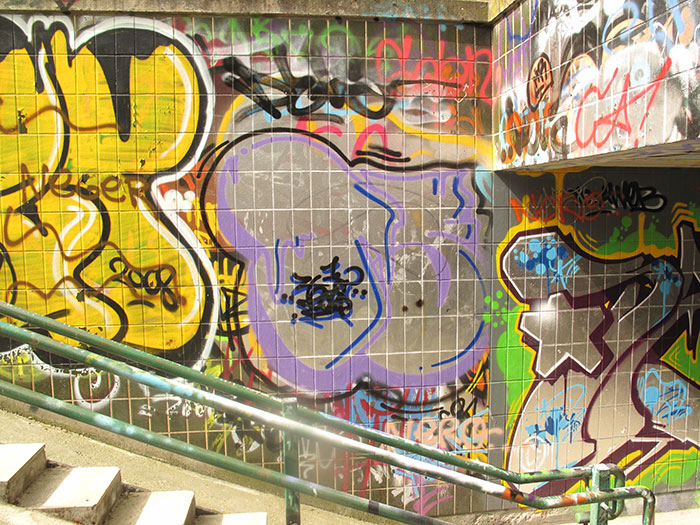
As the music shuddered, rolled and swirled, the Deadfolk seemed to come alive. I felt like a geriatric by comparison, drunkenly shuffling from foot to foot while they arched their backs and swiveled their boneless hips, bending slowly back and forth like a nest of horny snakes. I caught glimpses of faces in the crowd—Deadgals, their eyes flashing like tiny mirror-balls, mouths half-open as they whisper-mimed the words of some half-forgotten urban diva. They looked like liquid archetypes, fallen angels that were unafraid of death. But even though I was school-kid curious to know what these folks did for kicks I still wasn’t quite ready to dance one-on-one with a Deadgal.
The music was decades old—archaic AquaCrunk and robotic Wonk—but the vocoderized lyrics, syrupy samples and synth-patches now seemed strangely prescient, as if they'd been specifically created to serve that moment. I had a serious drunk on, but it felt like the past, present and future had all just collided in front of me, recombining in some way that I couldn’t quite quantify. The evening became a blurred snapshot that seemed to catch human beings in the act of becoming something else. It felt like I was witnessing the start of some mass migration.
I’m not sure what time we staggered out into the street, but it felt good just to mill around and soak up the soft orange glow from the albedo-lamps. Jack and I drifted down McMurdo, past the craft galleries and the salvage-yard where they respun old furniture. A slo-glass shop-front stored our stumbling reflections and transmorphed them into an animated chorus-line. Smartpaint graffiti tags scuttled across a nearby wall—freaky little spider-words that infested the brickwork with their creator’s name. When we reached Devonshire Square we slumped down on the steps of the public aquifer that doubled as a decorative water-feature.
A couple minutes later, a squad of crowdsourced JPs rolled up on bicycles and in the back of a bubble-fusion paddy-wagon. A patrolman from the Parish PD supervised them while they used a can of HardFroth to blow the lock off the door of a dingy-looking greystone opposite. They poured inside. Seconds later, we heard muffled shouts and the sound of breaking glass.
A Boom Kid wandered past, his hair-weaves tied up in thick rope-knots. Interlaced Nu Jump thudded from the adhesive speaker-disks he’d stuck all over his hairless chest. Jack yelled at him, pointing at the paddy-wagon. “Hey, man! What’s going on across the road?”
The kid glanced at Jack and said, “#fuckingcops #newsfeedthree #jinjooksuidicecults #yellowdeadfellas #horneedeadgalspornflow.” He was byt.synching his filtered voice in time to the music. And then he walked on.
“What the fuck did he just say?” asked Jack.
“I’m not sure,” I slurred, half-laughing, “I don’t speak CrossThread.”
“I did think about maybe signing on as a Cop—y’know, once I’d accrued enough Life Credits.” He’d told me earlier that he was still working out his probation period. After reconstitution Deadfolk were accessed and if their mental health was sound they were assigned to community work programs until they had offset the resource costs involved in building them. Maybe he was right, perhaps there was no such thing as “free”.
“A Cop? I never thought you’d wind up working for The Man.”
“There is no Man anymore, Arthur. Just the Turings.” We sat for a few moments and listened to water flow down the sides of the ion-exchange slabs. “Us Deadfolk, we need to, I dunno, find smarter ways of policing ourselves. There’s a thousand problems to fix—not just the bioengineering stuff, but prejudice, labor abuses, prostitution, et cetera; there’s an entire legal system to overhaul. We owe it to ourselves—all of us—to give this our best shot. We can’t just sit back and let a bunch of machines make all the tough decisions for us.”
“I’ve got your old guitar,” I told him. “Mom kept it after you died. It’s got no strings, but—well, if you want it, it’s yours. I figure your hands have got a wider span now.”
He nodded almost imperceptibly. Ripples of light reflected off the water and moved across his face like waveforms. There was a strange stillness to him—an inner calm—as if he had briefly surrendered himself back to the void. The Deadfolk probably had a word for it.
“Do you—do you think she’ll come back one day too?”
“I don’t know,” he said and smiled, but this time there was something subtly different about it. “Maybe part of her already has.”
About the Author
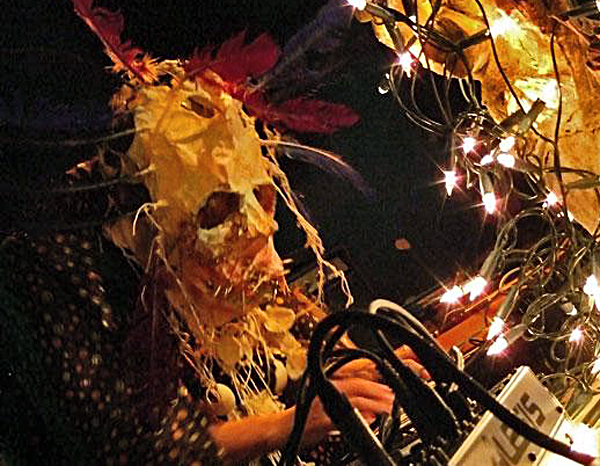
Kek-w lives in Yeovil, a small, Arkham-like market-town in the South-West of England. He writes fiction, comic scripts, music journalism, cultural commentaries and computer code. His stories “Blue Raspberries” and “Cone Zero” were nominated for awards by the BSFA and the BFS. He is currently performing and recording improv electronic music as Orchestra Intangible ‘73 and as a member of Junkcrunch. You can catch him talking in his sleep on the Kid Shirt blog.
Please mention the author or this piece's name in your comment.